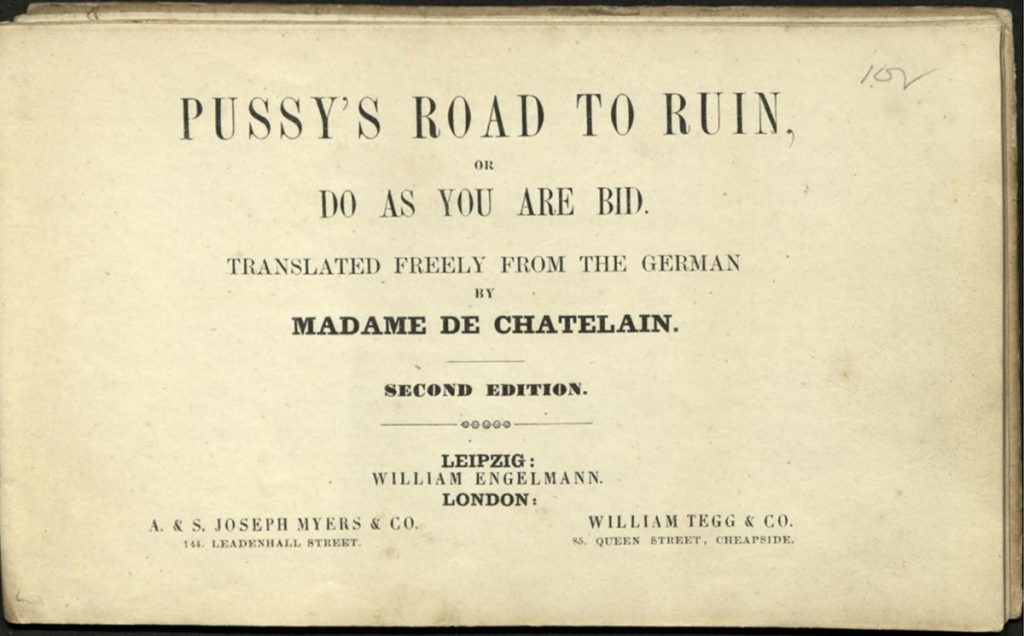 In a recurrent narrative arc in nineteenth-century literature, small acts of disobedience weaken the protagonist’s moral resilience, lead to increasingly serious offenses, and then inexorably to crime and punishment. Boys tell fibs, are shunned by more ethical companions, join criminal gangs, and end their lives on the gallows. Young women play hooky from church, associate with undesirable and lower-class girls – then their even worse brothers – and end up pregnant, prostituted, and disowned. The defining characteristics of these tragic narratives are bad companions, downward social movement, degradation, and destruction,
In a recurrent narrative arc in nineteenth-century literature, small acts of disobedience weaken the protagonist’s moral resilience, lead to increasingly serious offenses, and then inexorably to crime and punishment. Boys tell fibs, are shunned by more ethical companions, join criminal gangs, and end their lives on the gallows. Young women play hooky from church, associate with undesirable and lower-class girls – then their even worse brothers – and end up pregnant, prostituted, and disowned. The defining characteristics of these tragic narratives are bad companions, downward social movement, degradation, and destruction,
With upper- and middle-class Regency and Victorian hesitation to discuss sex openly with girls and women, loss-of-purity narratives become loci of linguistic negotiation. Lydia Bennett’s immoral connection with Mr. Wickham in Pride and Prejudice is characterized by her conventional sister Mary: “Unhappy as the event must be for Lydia, we may draw from it this useful lesson: that loss of virtue in a female is irretrievable — that one false step involves her in endless ruin — that her reputation is no less brittle than it is beautiful — and that she cannot be too much guarded in her behaviour towards the undeserving of the other sex.” For younger readers, symbolism was more appropriate than even this circumlocution, and one common way to touch on charged relationships between adults was with stories about animals, especially cats.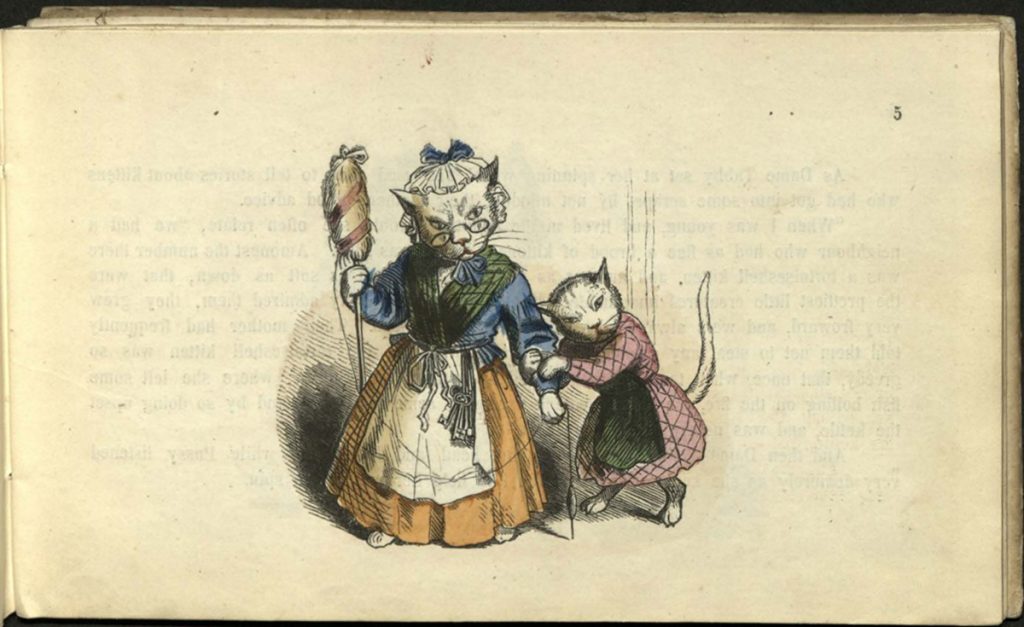 At the beginning of Pussy’s Road to Ruin, Pussy is a model kitten. Her mother teaches her to purr when the children pet her, and absolutely not to scratch them. She helps with domestic work, and listens carefully to maternal good advice and cautionary stories about kittens who are disobedient, self-centered, and idle.
At the beginning of Pussy’s Road to Ruin, Pussy is a model kitten. Her mother teaches her to purr when the children pet her, and absolutely not to scratch them. She helps with domestic work, and listens carefully to maternal good advice and cautionary stories about kittens who are disobedient, self-centered, and idle.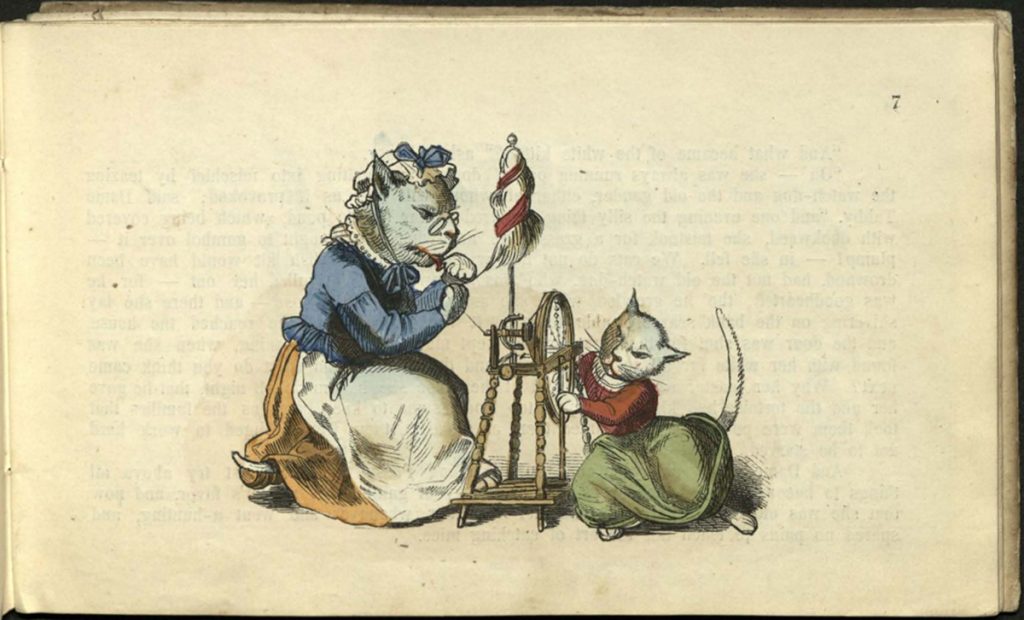 Above all, her mother teaches her to be industrious, to earn her place in the household, and to deserve the good opinion of their master by hunting mice.
Above all, her mother teaches her to be industrious, to earn her place in the household, and to deserve the good opinion of their master by hunting mice.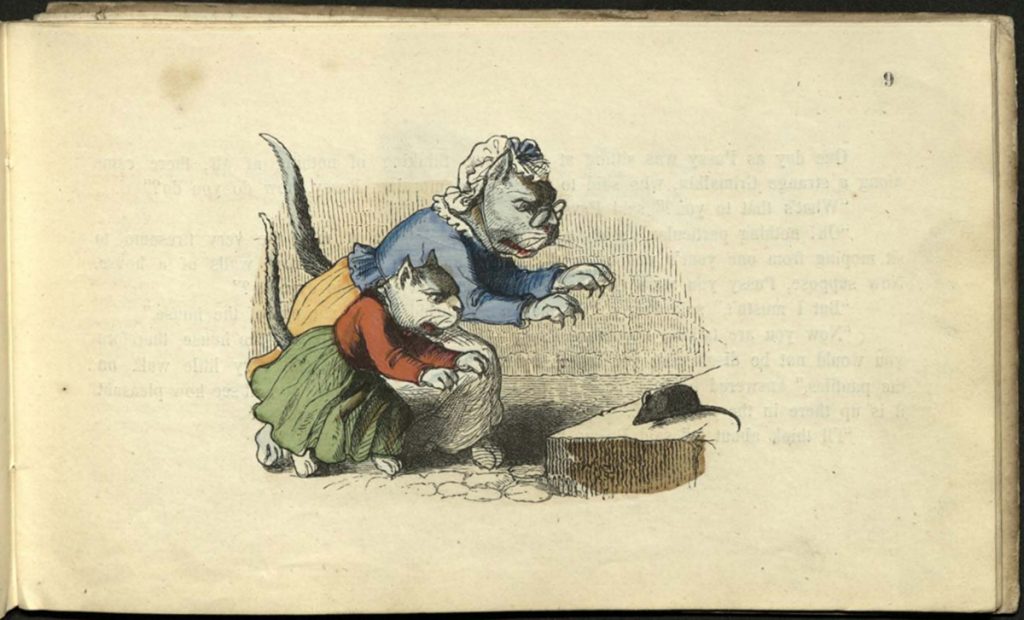 Unfortunately, Pussy is a typical teenager, and one day when she is wasting time on the stoop, a disreputable, older male cat (“a strange Grimalkin”) chats her up.
Unfortunately, Pussy is a typical teenager, and one day when she is wasting time on the stoop, a disreputable, older male cat (“a strange Grimalkin”) chats her up. 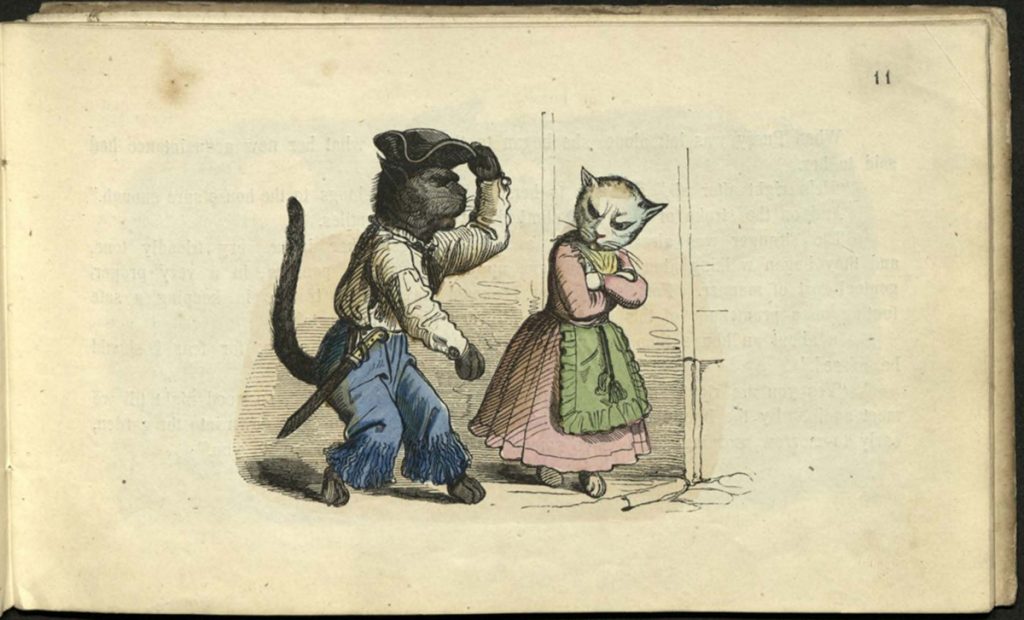 Although she very properly rejects his casual familiarity to begin with, he invites her to meet him on the roof that evening. He begins his psychological assault by denigrating her style of life, disputing her interpretation of her mother’s rules, and coaxing her with promises of enjoyment.
Although she very properly rejects his casual familiarity to begin with, he invites her to meet him on the roof that evening. He begins his psychological assault by denigrating her style of life, disputing her interpretation of her mother’s rules, and coaxing her with promises of enjoyment.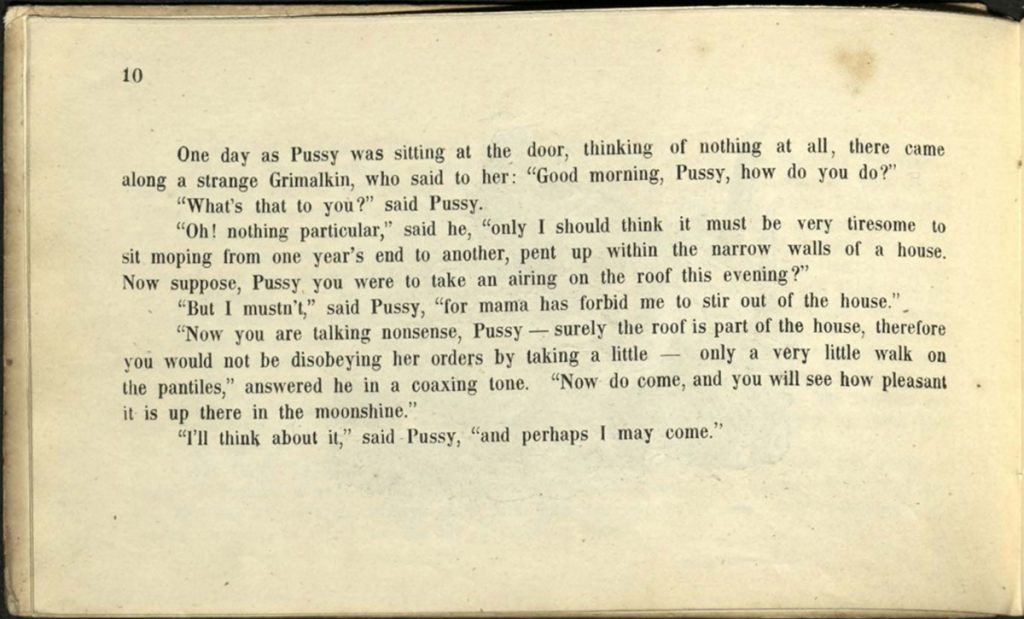 Pussy lets herself be persuaded, and they pass a pleasant hour, with the tomcat behaving like a gentleman.
Pussy lets herself be persuaded, and they pass a pleasant hour, with the tomcat behaving like a gentleman. 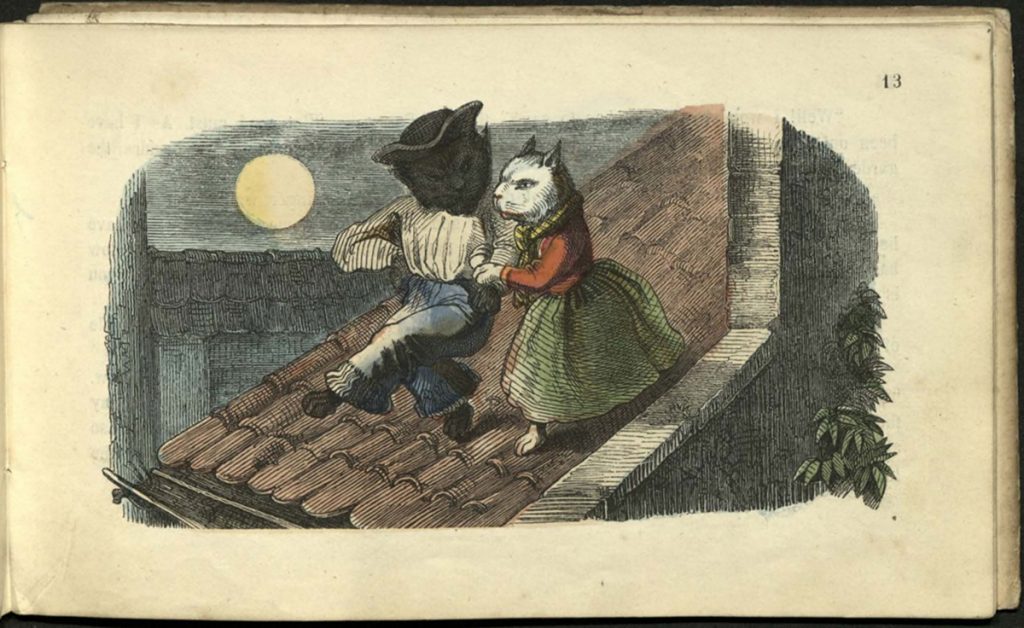 But like other manipulative males, as they part respectably, he sets Pussy up to comply with a less conventional request.
But like other manipulative males, as they part respectably, he sets Pussy up to comply with a less conventional request.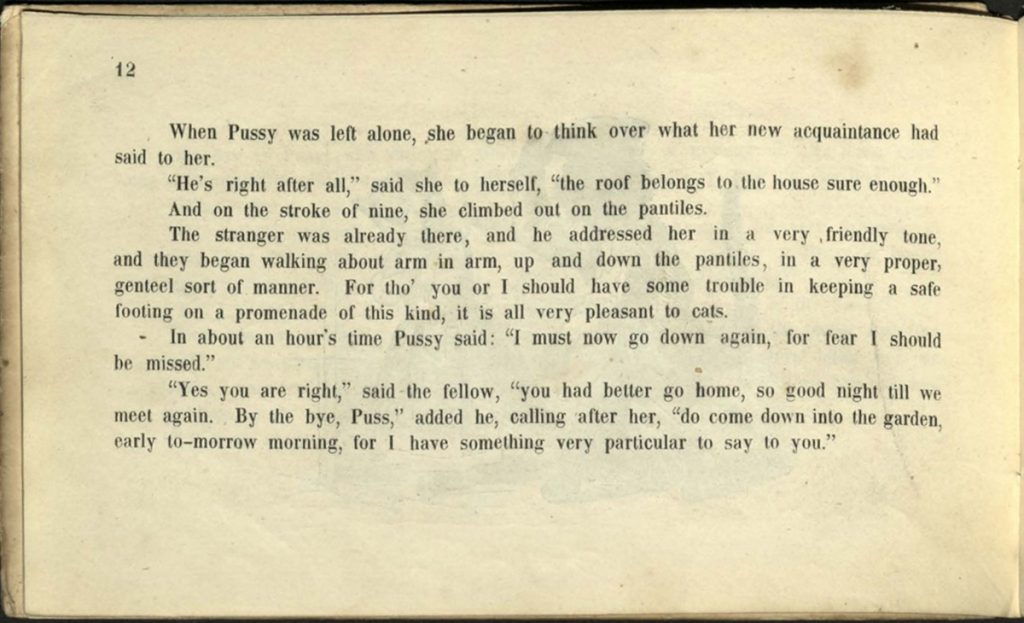 He induces Pussy to become his accomplice in killing a jackdaw. The following day, guided by Grimalkin’s advice on how tasty domestic chickens are, she undertakes two additional murders,.
He induces Pussy to become his accomplice in killing a jackdaw. The following day, guided by Grimalkin’s advice on how tasty domestic chickens are, she undertakes two additional murders,. 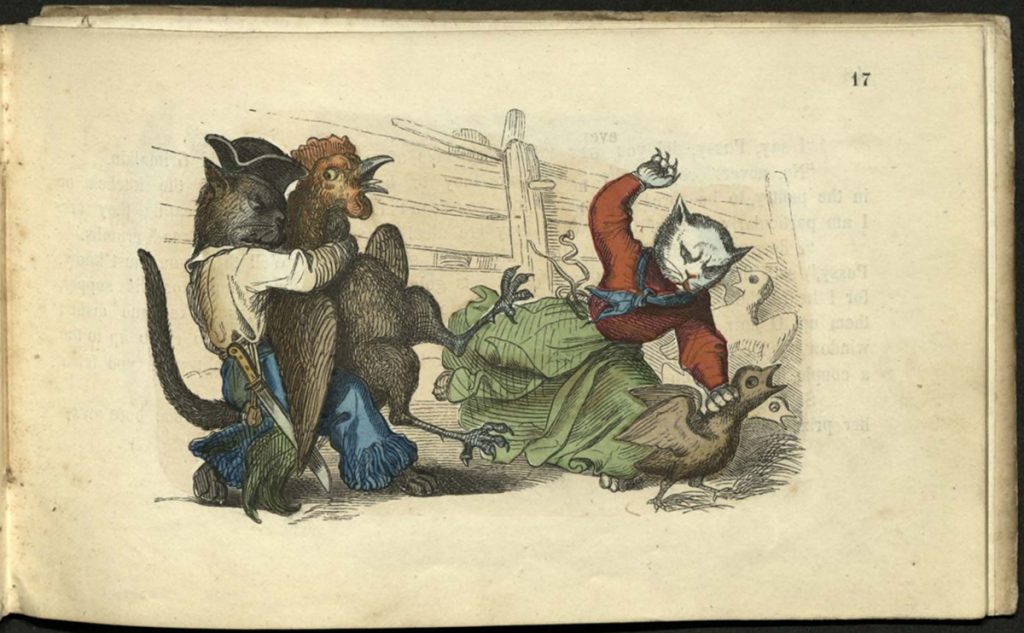 He convinces her to commit the more serious offense – his own role being to restrain the rooster – while claiming he is taking care of her well-being during this crime, imposing gratitude upon her and tying her to him emotionally.
He convinces her to commit the more serious offense – his own role being to restrain the rooster – while claiming he is taking care of her well-being during this crime, imposing gratitude upon her and tying her to him emotionally.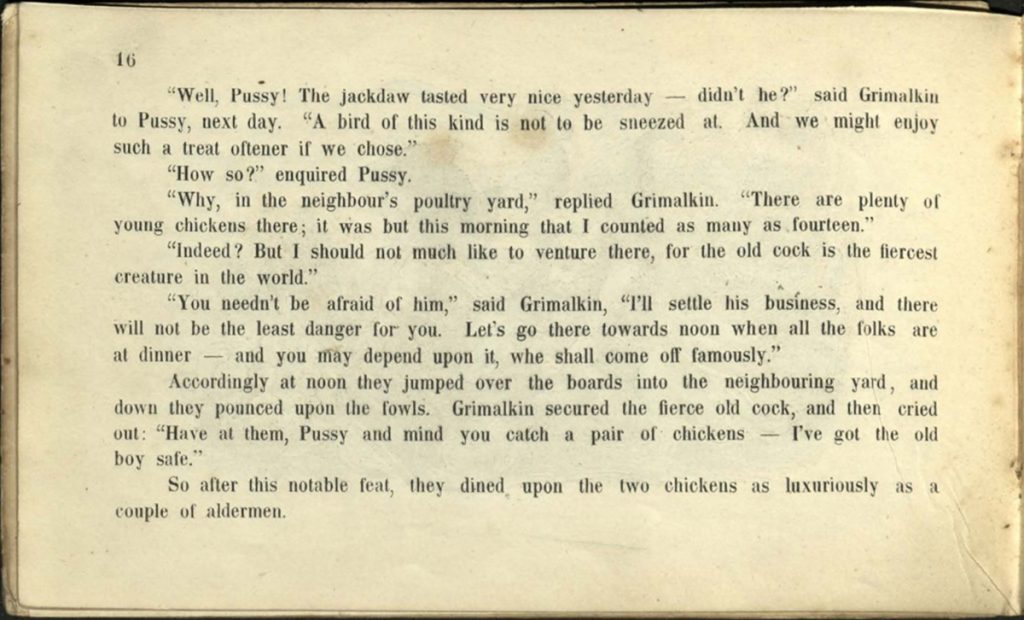 Next he suggests she take cooked mutton chops from the kitchen and later convinces her to steal a string of smoked sausages.
Next he suggests she take cooked mutton chops from the kitchen and later convinces her to steal a string of smoked sausages. 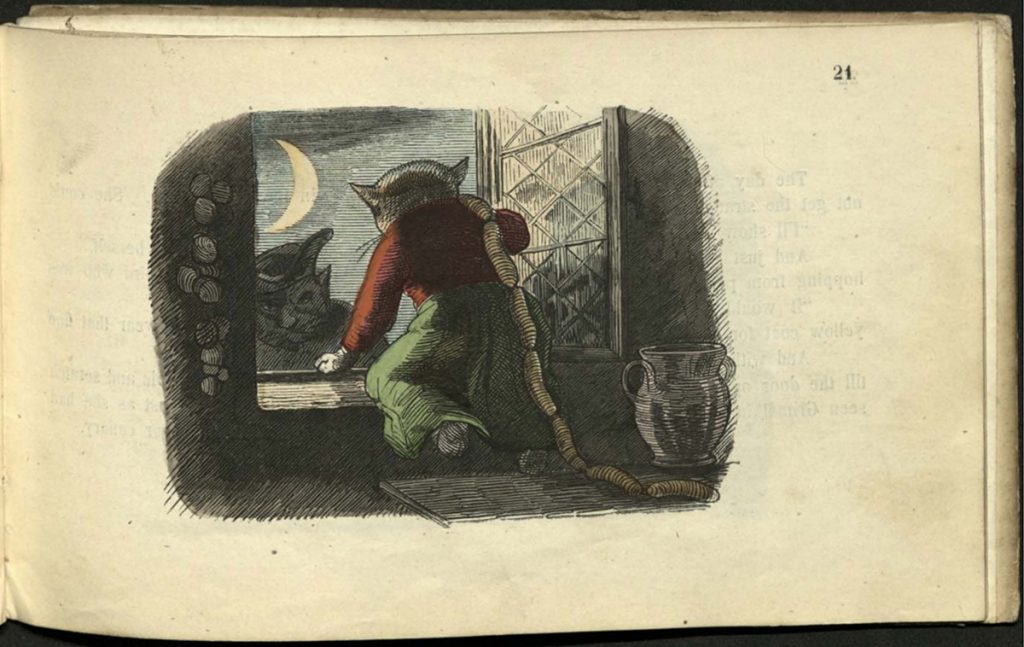 Meanwhile he establishes his authority by criticizing Pussy’s knowledge and intelligence, and speaking abusively of her inexperience.
Meanwhile he establishes his authority by criticizing Pussy’s knowledge and intelligence, and speaking abusively of her inexperience.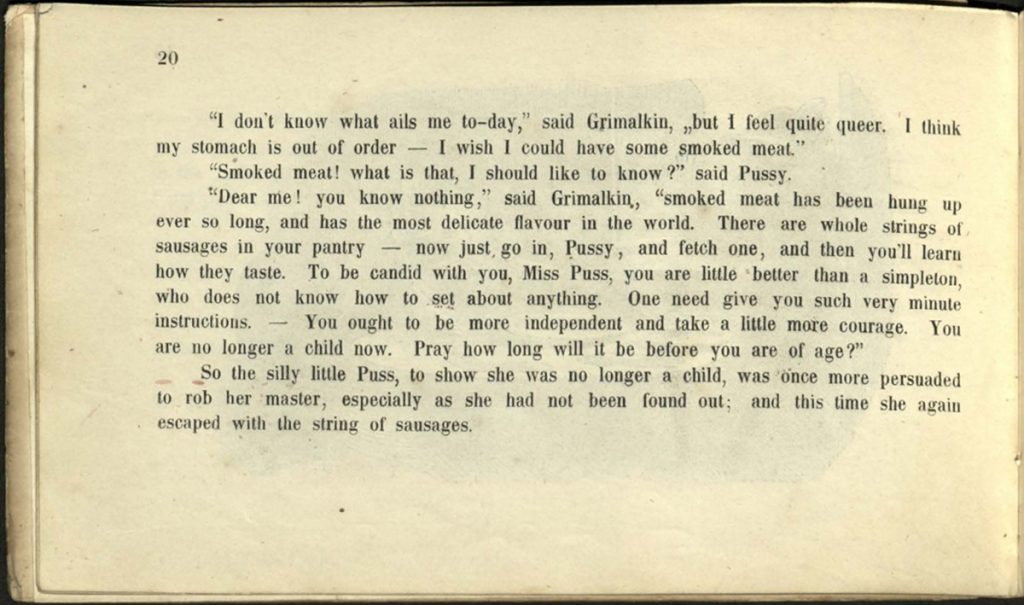 Like other young females, Pussy internalizes the criticism, and anxious to overcome her perceived inadequacy and gain his good opinion, she commits a crime on her own initiative, with only the recollected prompting of the unscrupulous Grimalkin.
Like other young females, Pussy internalizes the criticism, and anxious to overcome her perceived inadequacy and gain his good opinion, she commits a crime on her own initiative, with only the recollected prompting of the unscrupulous Grimalkin. 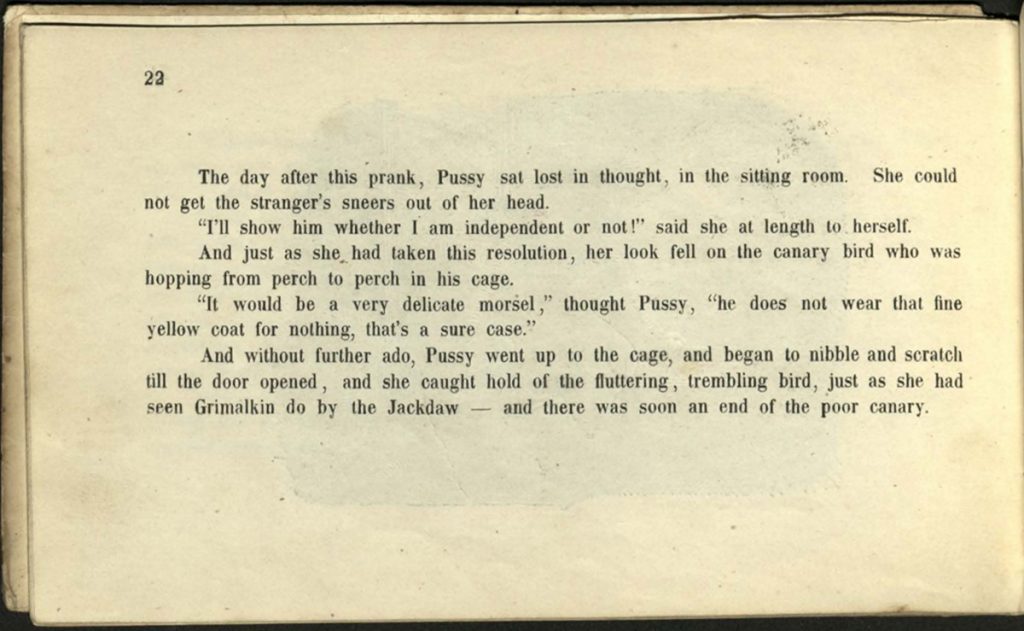 She kills the pet canary, perverting the skills her mother taught her to protect the household.
She kills the pet canary, perverting the skills her mother taught her to protect the household.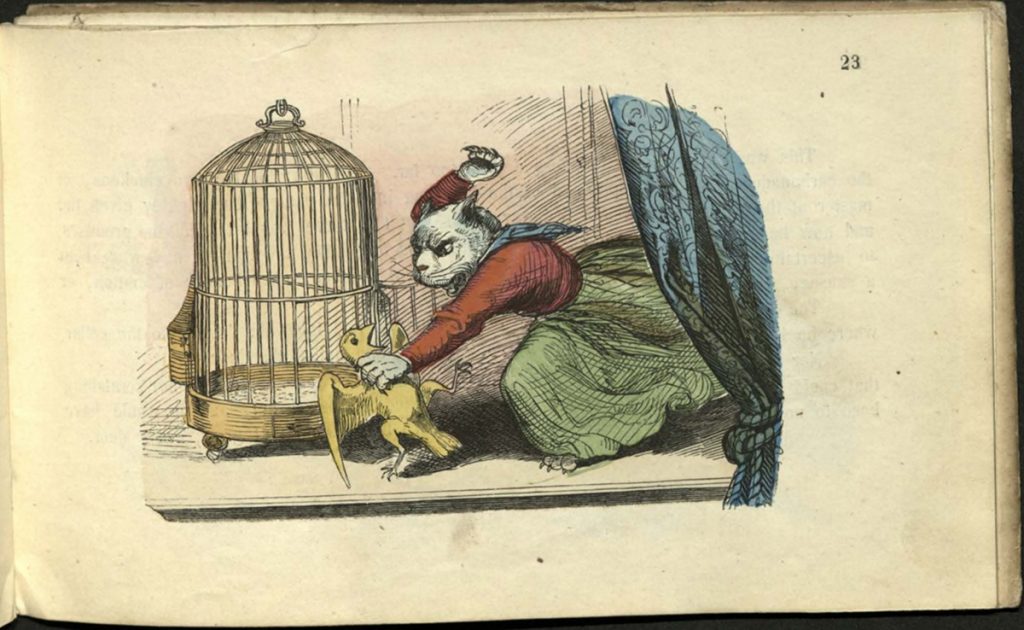 Of course, at this point the master of the house catches Pussy and incarcerates her in the cellar, where she is obliged to subsist on mice, rather than the fine food she has become accustomed to under the tuition of her deceiver. Grimalkin disappears, leaving Pussy to suffer her fate while he entices some other foolish young cat to do what she ought not.
Of course, at this point the master of the house catches Pussy and incarcerates her in the cellar, where she is obliged to subsist on mice, rather than the fine food she has become accustomed to under the tuition of her deceiver. Grimalkin disappears, leaving Pussy to suffer her fate while he entices some other foolish young cat to do what she ought not.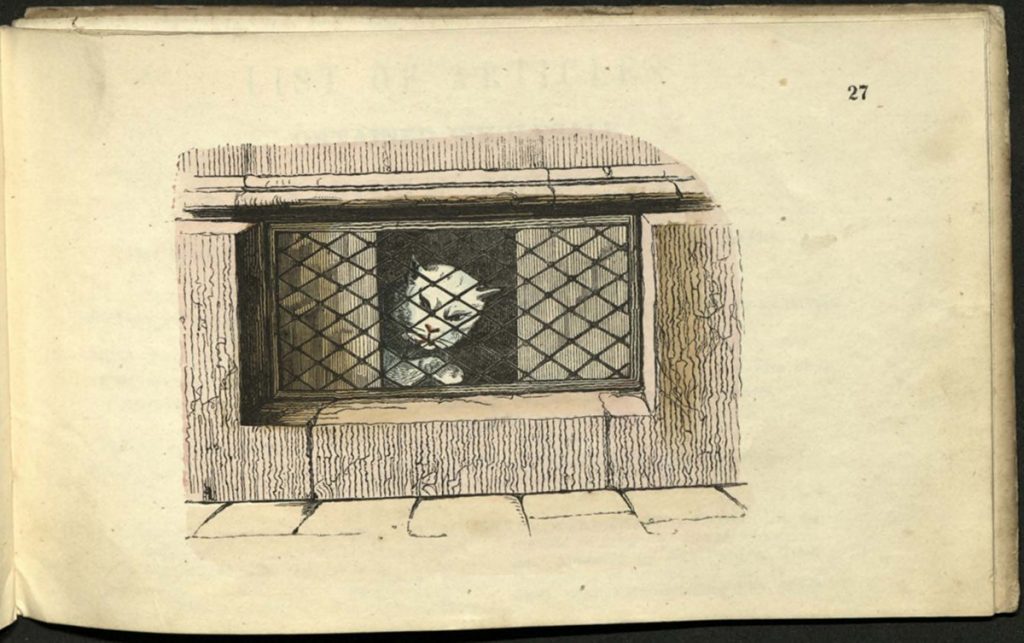 Thus Pussy reaps the certain fruits of having been too little guarded in her behavior towards the undeserving of the other sex. Whether this lesson can be learned by the juvenile reader – and whether she can translate the lesson about obedience into one of chastity – is left to the imagination.
Thus Pussy reaps the certain fruits of having been too little guarded in her behavior towards the undeserving of the other sex. Whether this lesson can be learned by the juvenile reader – and whether she can translate the lesson about obedience into one of chastity – is left to the imagination.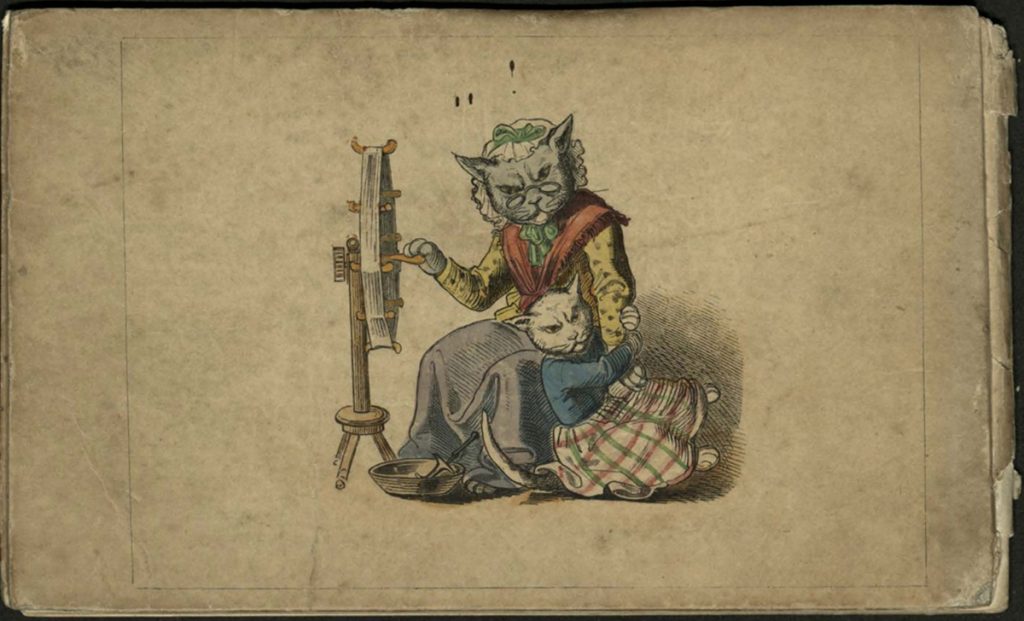 Our copy of Pussy’s Road to Ruin can be read on the Internet Archive.
Our copy of Pussy’s Road to Ruin can be read on the Internet Archive.
With the continuing closure of the Library, we are blogging regularly about books from the exhibition, The Girl’s Own Book. Please follow us on Facebook or subscribe here for notices of new blog posts.
Clara de Chatelain. Pussy’s Road to Ruin, or, Do as You are Bid. Leipzig: W. Engelmann; London: A. & S. Joseph Myers, 1840. 2nd ed.
